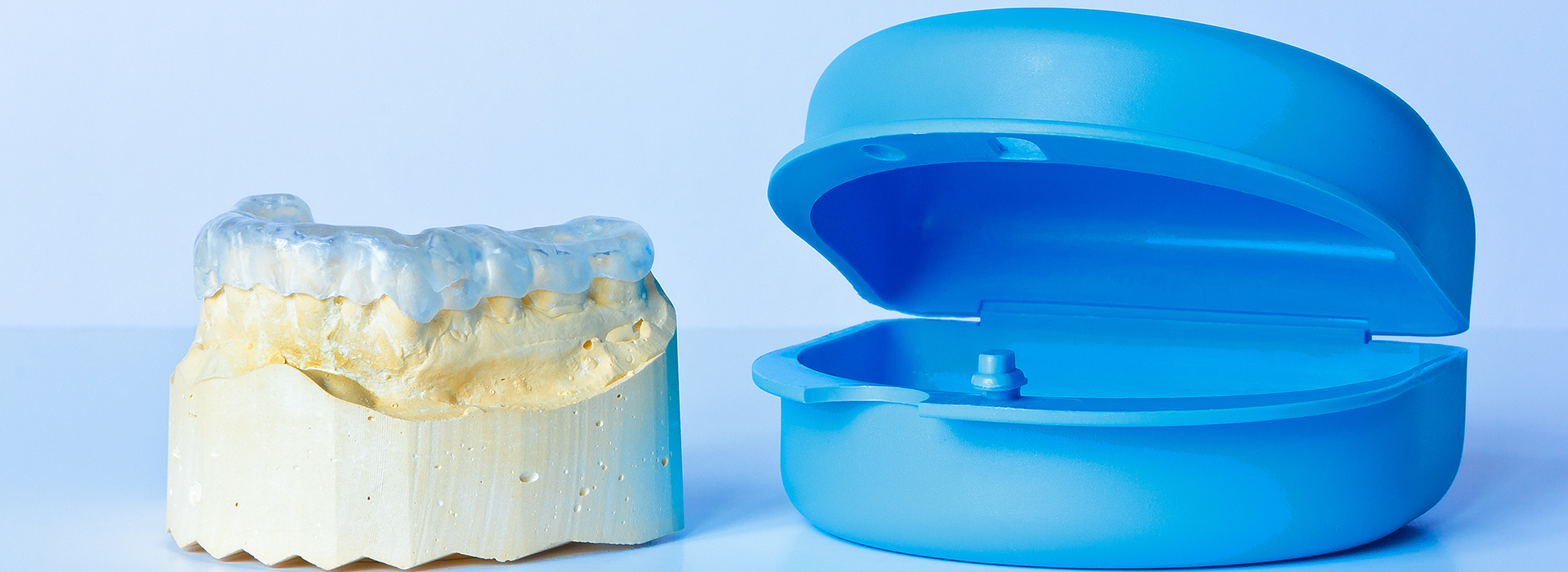New Patients
(860) 218-9463
Existing Patients
(860) 421-0144

Bruxism is the medical term for the repetitive clenching or grinding of teeth. While some people grind during the day, it frequently happens during sleep and often goes unnoticed until symptoms appear: morning jaw stiffness, recurring headaches, worn tooth surfaces, or a feeling that teeth are looser than they should be. Left untreated, these patterns can lead to lasting damage to teeth, restorations, and the temporomandibular joint (TMJ).
Many factors can contribute to bruxism. Emotional stress and anxiety are common triggers, but sleep disorders, certain medications, an abnormal bite, or missing and misaligned teeth can also play a role. Identifying the likely contributors helps guide treatment and reduce the chances of recurrence.
Because bruxism is both dental and muscular in nature, early recognition is important. Patients who seek evaluation sooner tend to avoid more extensive dental repairs and chronic jaw pain. If you live in the area, an evaluation at our office in Unionville, CT can clarify the cause and point you toward the most appropriate options.
A night guard is a removable appliance worn over the teeth during sleep to create a protective barrier between upper and lower teeth. By preventing direct contact, the guard absorbs and redistributes the forces generated by clenching and grinding. This reduces wear on enamel, lowers the risk of cracked or chipped teeth, and decreases strain on the jaw muscles and joint.
Beyond protecting hard surfaces, night guards can change how the jaw muscles engage during sleep. A properly designed appliance keeps the mandible in a slightly different position that encourages muscle relaxation and can break the unconscious habit of grinding. For many patients, this results in fewer headaches and a more comfortable morning routine.
Custom-fitted night guards are made from impressions or digital scans of a patient’s teeth. Because they match the individual dental anatomy, they fit more securely and feel more comfortable than over-the-counter alternatives. A precise fit also helps the guard stay in place throughout the night and improves its protective effectiveness.
Night guards vary in material and thickness, and the ideal choice depends on the severity of bruxism and the patient’s bite. Softer, thinner guards may be suited for mild clenching and are often easier to adapt to initially. For moderate to severe grinding, thicker, more durable materials are commonly recommended because they withstand greater forces without deforming.
Materials range from flexible thermoplastics to rigid acrylics. Each material has trade-offs: flexible guards can offer comfort but may wear faster, while rigid guards are typically longer-lasting and provide a stable platform for the teeth. Your dentist will weigh comfort, durability, and oral health needs when suggesting a design.
In addition to material, there are different design philosophies. Some guards focus on cushioning and protection, while others work to slightly reposition the jaw to reduce muscle activity. A thoughtful evaluation will determine which style best balances protection and comfort for your specific situation.
Because one size does not fit all, investing in a professionally made appliance ensures that material and design choices align with your dental condition and lifestyle. A tailored approach helps patients accept and consistently wear the device, which is essential for achieving results.
The process begins with a comprehensive exam to evaluate tooth wear, jaw joint function, and any contributing factors such as bite problems or missing teeth. Impressions or digital scans of the mouth are then taken to create a model for fabrication. These records let the dental lab or in-office milling system produce an appliance that fits precisely.
At the initial fitting visit, the dentist will check for proper seating, make minor adjustments, and confirm that the appliance does not interfere with breathing or speech. It’s normal to require a brief adaptation period as the mouth becomes accustomed to wearing the guard. The team will provide guidance on how to insert, remove, and care for the device.
Follow-up is a key part of success. A short check appointment after the first few nights confirms fit and comfort and allows for any necessary refinements. Periodic reviews during routine dental visits ensure the guard continues to perform as intended and that changes in the bite or dental work are addressed.
Proper care extends the life of a night guard and keeps it hygienic. Daily rinsing with cool water and gentle brushing with a soft toothbrush are usually recommended. Avoid hot water, which can warp thermoplastic materials, and do not use abrasive cleaners or strong chemicals. When not in use, store the appliance in its ventilated case to protect it from damage and contamination.
Over time, any night guard will show signs of wear, and its protective qualities may change. Regular inspection—by you and during dental checkups—helps determine when repair or replacement is needed. Typical indicators include thinning of the material, visible cracking, changes in fit, or persistent odors that cleaning cannot remove.
Maintaining good oral health alongside guard use is important. If restorative treatment, orthodontics, or extractions are required, the guard may need to be adjusted or remade to accommodate those changes. Open communication with the dental team ensures the appliance continues to protect both natural teeth and dental work effectively.
For patients who commit to regular wear and routine maintenance, night guards are a proven tool for preventing further dental damage and improving comfort. Consistent use combined with periodic professional oversight yields the best long-term outcomes.
Summary: Night guards are a conservative, practical solution for managing the damaging effects of bruxism. They protect teeth, reduce muscle strain, and can improve sleep-related symptoms when selected and fitted correctly. For personalized advice and a thorough evaluation, contact Newpoint Family Dental to learn how a custom night guard could help you. We welcome inquiries and are available to discuss the best approach for your oral health needs.
